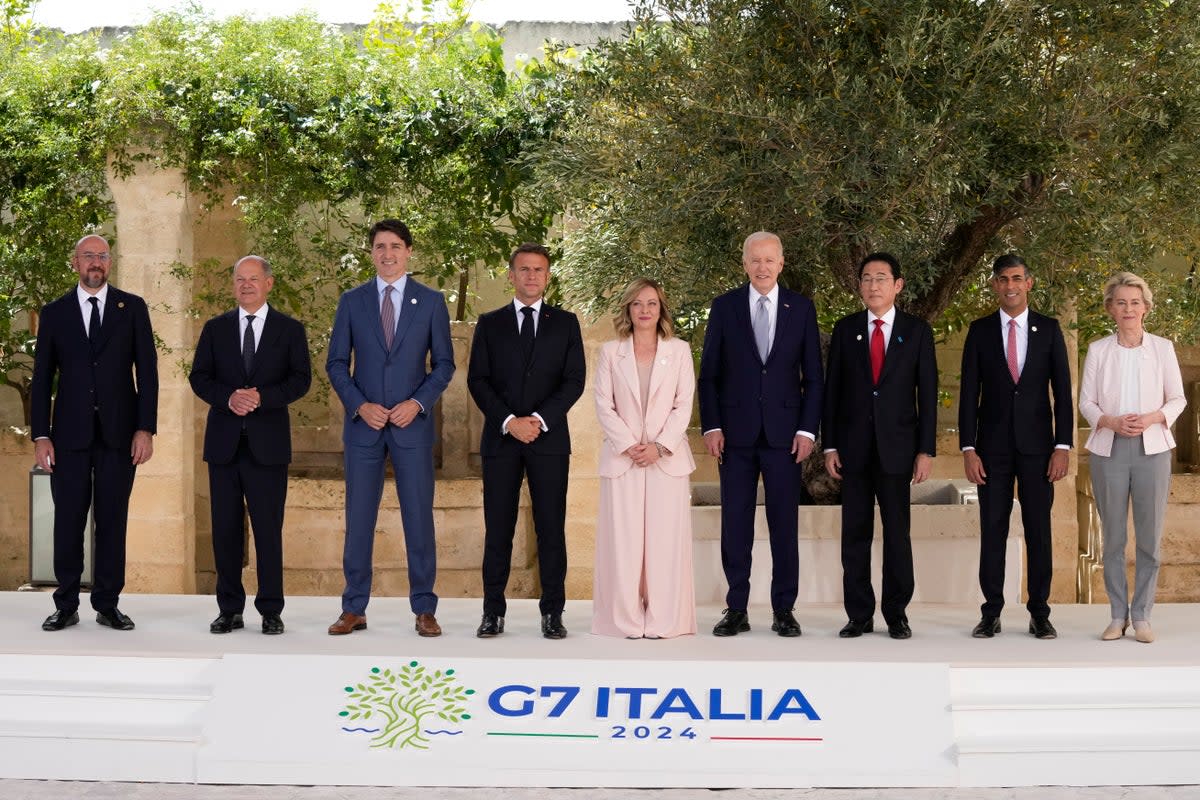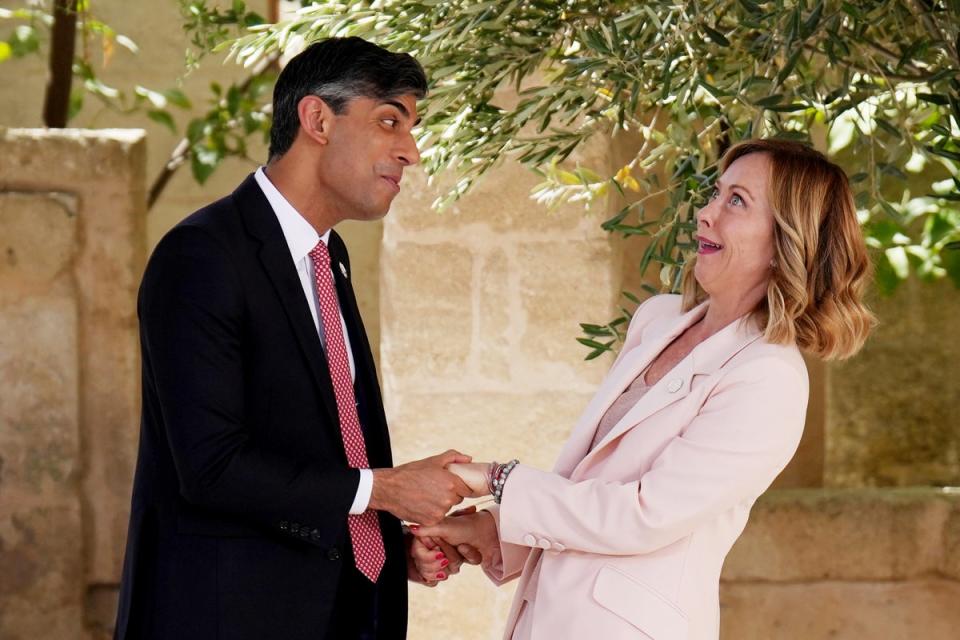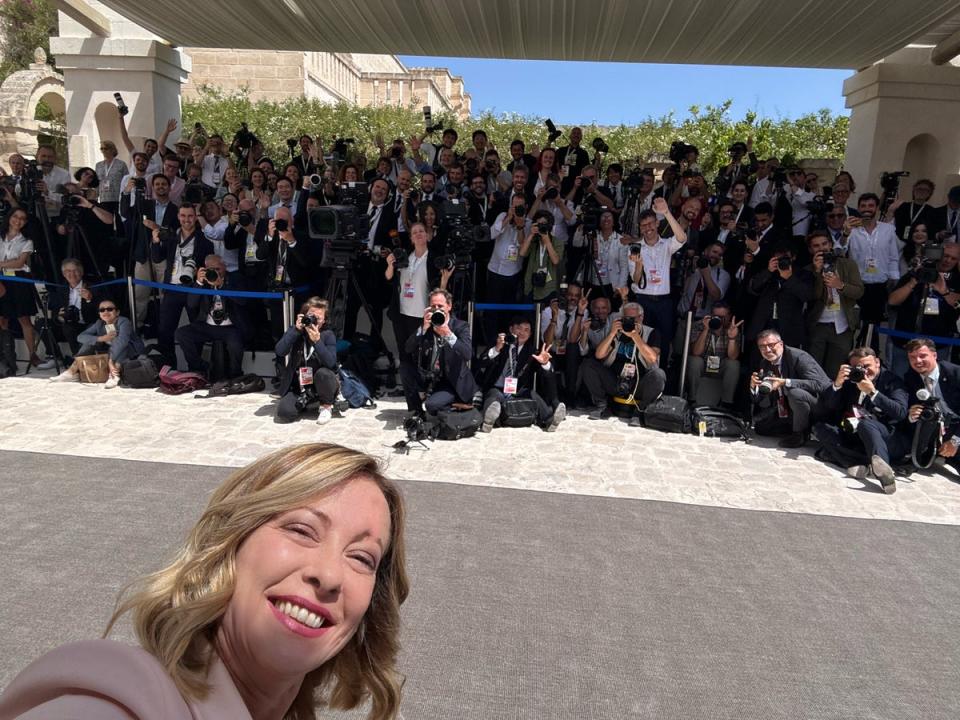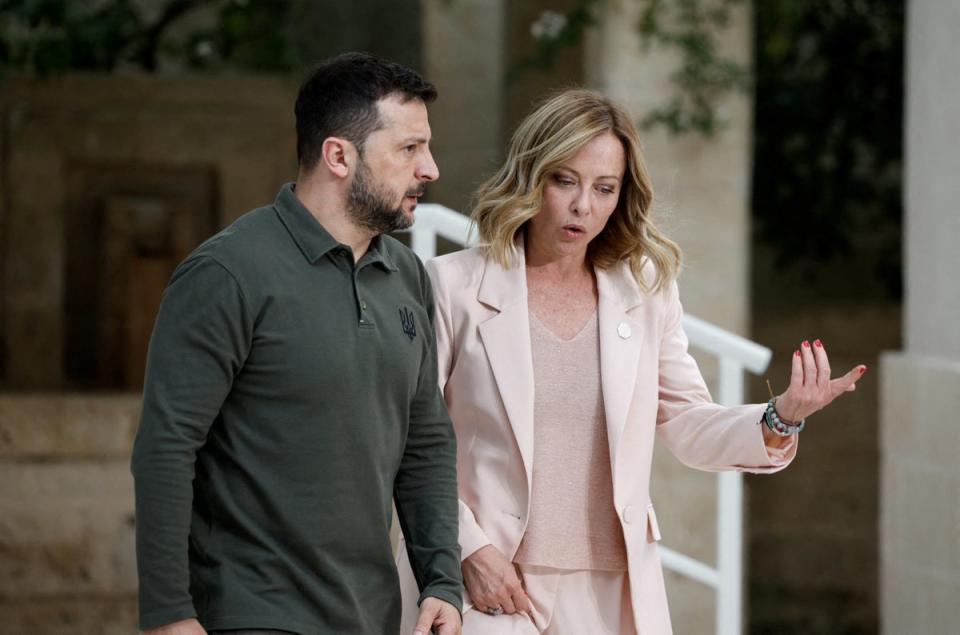G7 leaders strike deal on $50bn funding for Ukraine using Russian assets

G7 leaders have reached a deal to use profits from frozen Russian assets to provide around $50bn (£39bn) worth of support to Ukraine.
It came after Ukrainian president Volodymyr Zelensky said he expected “important decisions” from the summit in Italy, with leaders from the UK, US, Canada, France, Germany, Italy, and Japan seeking to shore up support for Kyiv as several of them face elections or political turmoil at home.
Also on Thursday, US President Joe Biden agreed to a sweeping bilateral security agreement that will see his country and Ukraine work together “to help deter and confront future aggression against the territorial integrity” of either state.
Under the support funding, G7 members will provide the funds using profits earned from Russia’s frozen central bank assets, most of them held in the European Union, as collateral. The finer details of how much of the money will be provided by the nations involved is still to be finalised, but leaders said it showed unity in the face of Vladimir Putin’s invasion of Ukraine.
“It’s a very strong message to Putin that Putin cannot outlast us, and we will stand by Ukraine as long as it takes,” European Commission president Ursula von der Leyen said. “It is not European taxpayers that are paying for the Russian damage [in Ukraine] but it is Russia,” she added.
The process involves using the profits, essentially the dividends and maturities, of Russia’s roughly $300bn assets abroad, frozen after Moscow launched its invasion in 2022.
Kyiv has been calling for these frozen assets for years but the move is a major boost to Ukraine as it battles through a difficult 2024 against a better-armed Russia.
“Finally, we see the first step of fairness in making sure that the aggressor, and not the good people from countries that support us, are paying for Ukraine’s victory,” said Kira Rudik, an opposition leader in Kyiv’s parliament, the Verkhovna Rada.
“We applaud this step. We hope that it is only the first of many more steps. And we will use this money wisely.”

Ms Rudik, as well as Ukraine’s most senior figures, have called for all of Russia’s seized assets to be given to Kyiv. The decision to issue a loan to Ukraine secured against future interest from the assets is a middle-ground decision between sending the assets themselves and simply transferring to Kyiv the interest that has accrued over the past two-and-a-half years of Russia’s full-scale invasion.
In what may be his last G7 summit, Rishi Sunak was clear about the need for action, having arrived at the summit to a warm welcome from his Italian counterpart – and host – Giorgia Meloni.
Early in the day, they announced a sweeping new sanctions package targeting Moscow’s “shadow fleet”, which is secretly transporting oil to fund the war in Ukraine. Mr Sunak said this would “degrade Putin’s war machine”. Individuals and businesses based in China, Israel, Kyrgyzstan and Turkey were added to the UK’s sanctions list for supplying weapons, machine tools and micro-electronics to Russia’s military.
Mr Sunak also said he would announce up to £242m in bilateral assistance to Ukraine to support its immediate humanitarian and energy needs.

In his address to the summit, Mr Zelensky asked leaders to approve a “Marshall Plan” for Ukraine’s reconstruction after the damage caused by Russia’s invasion.
“We need a clear plan for the recovery of Ukraine. Similar to what the Marshall Plan was for Europe after the [Second World War],” he said.
Mr Zelensky also said that the recent lifting of restrictions on the use of Western weapons on targets inside Russia had given Ukraine added protection from airstrikes, particularly in the eastern city of Kharkiv – with the wider Kharkiv region facing an assault from Russian troops.
“However, we are still in search of additional Patriot [air-defence systems] and we need more of the same powerful steps that were taken (to enhance) our long-range strike capabilities,” the Ukrainian president said.
Mr Zelensky also signed a security deal with Japan. A similar 10-year agreement is expected with the US.

As for Mr Sunak, he also issued a statement with Joe Biden and Canadian PM Justin Trudeau accusing the Kremlin of using “lies, deceit, corruption and disinformation to undermine sovereignty and democracy” across Europe, just months before a Moldovan election where Russian meddling is of grave concern.
On the $50bn for Ukraine, Tom Keatinge, director of the Centre for Finance and Security at the Royal United Services Institute think tank, said: “This won’t be the end of the story.”
“Unfortunately, it can’t be the end of the story. There is more to do. But at least this particular bridge has been crossed and that is of tremendous benefit to the Ukrainians,” he added.
Reuters contributed to this report


